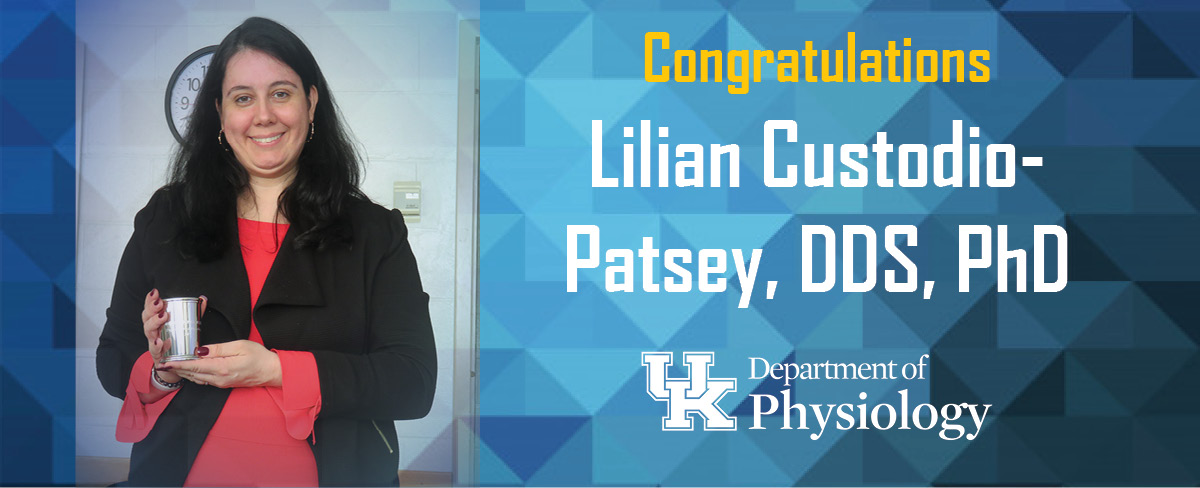Congratulations Lilian Custodio-Patsey, DDS, PhD
On Friday, March 22, 2019 Lilian Custodio-Patsey, DDS successfully defended her dissertation, earning her PhD. Congratulations Dr. Custodio-Patsey!
Spinal Kappa Opioid Receptor Activity Inhibits Adenylyl Cyclase-1 Dependent Mechanisms of Chronic Postoperative Pain
ABSTRACT
Chronic postoperative pain impacts millions of individuals worldwide that undergo a variety of surgical procedures. Opioids remain the mainstay analgesics of acute and perioperative pain; however, prolonged opioid therapy may lead to life-threating adverse effects, tolerance, dependence, and addiction. Therefore, unraveling the cellular mechanisms that drive persistent pain states and opposing endogenous analgesia provided by opioid receptor signaling, may lead to novel analgesics. Evidence suggests that tissue injury leads to increased sensitization of the spinal cord nociceptive neurons which increases susceptibility to chronic pain via an N-methyl-D-aspartate (NMDA) receptor activation of calcium-sensitive adenylyl cyclase isoform 1 (AC1). This phenomenon, named latent pain sensitization (LS), is mediated by a compensatory response of endogenous inhibitory systems. Here, we test the hypothesis that surgical insult promotes prolonged activation of kappa opioid receptors (KOR) which mask LS via attenuation of pro-nociceptive AC1 signaling pathways in both male and female animals. We employed a murine model of chronic postoperative pain that promotes LS in the spinal cord and closely resembles the phenotypic features of postoperative pain in human subjects. When behavioral signs of hyperalgesia resolved, we targeted spinal opioid receptor systems and pronociceptive modulators with intrathecal delivery of selective pharmacological antagonists and assessed behavioral signs of hyperalgesia and spinal nociceptive sensitization. We propose that LS is kept in remission by a long-lasting compensatory response of tonic endogenous KOR signaling that hinders a pronociceptive LS pathway that includes not only AC1 but also two downstream targets: protein kinase A (PKA) and exchange protein activated by cAMP (Epac1/2) - in a sex-dependent manner. Our results propose new therapeutic targets for the management of persistent postoperative pain and underscore the importance of tailoring sex-specific pain management strategies.
ACKNOWLEDGEMENTS
I would like to thank the following individuals among others who all contributed and assisted with my graduate training.
Dr. Brad Taylor for the opportunity of working in his laboratory and mentoring even after relocating to Pittsburgh and enabling me to complete my degree and continue my journey for knowledge.
This body of work could not have been completed without the following individuals: Dr. Bret Smith for his constant support and valuable guidance in this project. To my friend Dr. Romulo Albuquerque who holds animal protocol since last year, he is one of the individuals who inspired me to pursue this career trajectory. Dr. Liping Zhang for her ability to assist me and to bring levity to my spirits when the stress was great. Renee Donahue for showing up in the lab at all hours to support me and helping with laboratory techniques and for her friendship.
To my committee members: Drs. Bret Smith, Gregory Frolenkov and Reny de Leeuw for the mentorship and valuable insights during my graduate training at. I also thank Dr. Eric Blalock for serving as the outside examiner for my dissertation defense.
I also want to express my deep gratitude and appreciation for Dr. Linda Dwoskin and the NIDAT32016176 faculty for their mentorship, financial support of this project and valuable training in the field of addiction.
Finally, I would like to thank my family while separated by a great distance have always supported my endeavors. Especially my father Afranio who taught me that integrity, diligence and extreme perseverance are fundamental keys to achieve your goals even when they take shift. For my supportive and loving husband Edward and son Andrew for their constant support and motivation even in my absence throughout this process.
DOCTORAL COMMITTEE MEMBERS
Dr. Brad Taylor, Department of Physiology, Mentor
Dr. Bret Smith, Department of Neuroscience
Dr. Gregory Frolenkov, Department of Physiology
Dr. Reny de Leeuw, Division of Orofacial Pain
Dr. Eric Blalock, Department of Pharmacology and Nutritional Sciences, Outside Examiner
